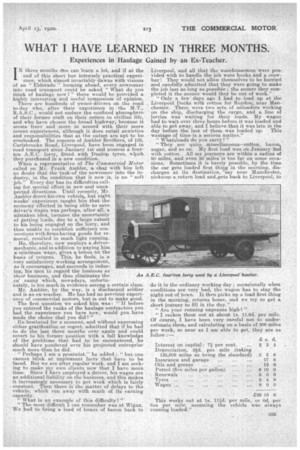WHAT I HAVE LEARNED IN THREE MONTHS.
Page 19

If you've noticed an error in this article please click here to report it so we can fix it.
Experiences in Haulage Gained by an Ex-Teacher.
I • N three months One can learn a lot, and if at the end of this short but intensely practical experi ence, which almost invariably dawns with visions of an " Eldorado" looming ahead, every newcomer into road transport could be asked "What -do you think of haulage now ? " there would be provided a highly interesting and useful symposium of opinion.
There are hundreds of owner-drivers on the road to-day who, after their experience in the MT., R.A.S.C., would not endure the con-fined atmosphere of their former craft on their return to civilian life, and who have chosen the broad highway, because it seems freer and more in accord with their more recent experiences, although it does entail anxieties and responsibilities that at the outset are apt to be overlooked. The concern of Ambler Brothers, of 136, Carisbrooke Road, Liverpool, have been engaged. in. road transport since January 1st and possess a fourton A.E.O. lorry, fitted with Dunlop tyres, which they purchased in a new condition. When a representative of The Commercial Motor called on Mr.. Frank Ambler, a chat with him left no doubt that the task,of the newcomer into the industry, in the condition that it now ,is, is no " soft job." Every day has its difficulties calling for .special effort in new axid unexpected directions. Until recently, Mr. Ambler drove his own vehicle,,„ but eight weeks' experience taught him that the economy effected in being able to save driver's wages was perhaps, after all, a mistaken idea, because the uncertainty of getting leads, due to a large extent to his being engaged on the lorry, and thus unable to establish sufficient connections with firms having goods for removal, resulted in much light running. s.• He, therefore, now employs a drivermechanic, and in addition to paying him a miniinuin wage, gives 4 bonus on the basis of returns. This, he finds, is a very satisfactory working arrangement, as it encourages, and succeeds in inducing, his men to regard the business as their business, and thus eliminates the ca' canny which, nowadays, unfortunately, is too much in evidence. among acertain class.
Mr. Amlele-ri by the way, is a discharged soldier and is an ex-teacher. He has had no previous experience of commercial motors, but is out to make good.
The first question we asked him was: " If before you entered the ranks of the haulage contractors you had the experience you have DOW, would' you have
. made the choice that you did?" .
He hesitated for a moment, and without. expressing either gratification or regret, admitted that if he had to do the last three months over again and could revert to his former. position with a full knowledge of the problems that had . to be encountered, he should have pondered over his projected enterprise much more than he did.
" Perhaps I Ma a pessimist," he added.; "but one cannot blink at unpleasant facts that have to be faced. But we are after regular work, and I am seeking to make my own clients now that I have more -time. Since I have employed a driver, his wages are an additional liability on the business, and this makes it increasingly necessary to get work which is fairly constant. Then there is the Matter of delays to the vehicle, which run away with much of its earning capacity.
What is an example of this difficulty? ". " The most difficultI can remember was at Wigan. We had to 'bring a load of boxes of bacon back to An
Liverpool, and all that the warehousemen were provided with to handle the job were hooks and a crowbar ! They would not allow themselves to be hurried and candidly admitted that they were going to make the job last as long as.possible ; the sooner they completed it the sooner would they be out of work." " Only a few days ago I had to load up at the Liverpool Docks with cotton for Roydon, near Manchester. There were two sets of unloaders working on. the ship, discharging the cargo, and a line of . lorries was waiting for their loads. My wagon had to wait over three hours before it was loaded and able to get away, and I believe that itwas late in the day before the last of them was loaded up. This wastage of timeis a serious matter."
" Whatdoads do you carry? " " They are quite miscellaneous—cotton, .bacon, sugar, and so on. My first load was on January 2nd with cotton. All my journeys are within a radius of 50 miles, and even 50 miles is too far on some occasions. Sometimes it is barely possible, by the time the car gets loaded first thing in the morning, discharges at its destination, 'say near Manchester, nickslup a return load and,gets back to Liverpool, to do it in the ordinary working day ; occasionally when conditions are very bad, the wagon has to stay the night out of town. It then picks up a load first thing in the morning, returns home, and we try to get a short journey to fill in the day." .
"Are your running expenses high?" " I reckon them out at about is. 11.6d. per mile. Of course, I have been ;very careful not to underestimate them, and calculating on a basis of 300 miles per week, so near as I am able to get, they are as follow :—


























